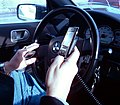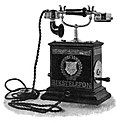Portal:Telephones

A telephone, commonly shortened to phone, is a telecommunications device that enables two or more users to conduct a conversation when they are too far apart to be easily heard directly. A telephone converts sound, typically and most efficiently the human voice, into electronic signals that are transmitted via cables and other communication channels to another telephone which reproduces the sound to the receiving user. The term is derived from Ancient Greek: τῆλε, romanized: tēle, lit. 'far' and φωνή (phōnē, voice), together meaning distant voice.
In 1876, Alexander Graham Bell was the first to be granted a United States patent for a device that produced clearly intelligible replication of the human voice at a second device. This instrument was further developed by many others, and became rapidly indispensable in business, government, and in households. (Full article...)

A mobile phone or cell phone is a portable telephone that allows users to make and receive calls over a radio frequency link while moving within a designated telephone service area, unlike fixed-location phones (landline phones). This radio frequency link connects to the switching systems of a mobile phone operator, providing access to the public switched telephone network (PSTN). Modern mobile telephony relies on a cellular network architecture, which is why mobile phones are often referred to as 'cell phones' in North America. (Full article...)
A smartphone is a mobile device that combines the functionality of a traditional mobile phone with advanced computing capabilities. It typically has a touchscreen interface, allowing users to access a wide range of applications and services, such as web browsing, email, and social media, as well as multimedia playback and streaming. Smartphones have built-in cameras, GPS navigation, and support for various communication methods, including voice calls, text messaging, and internet-based messaging apps. Smartphones are distinguished from older-design feature phones by their more advanced hardware capabilities and extensive mobile operating systems, access to the internet, business applications, mobile payments, and multimedia functionality, including music, video, gaming, radio, and television. (Full article...)
Selected article -

An answering machine, answerphone, or message machine, also known as telephone messaging machine (or TAM) in the UK and some Commonwealth countries, ansaphone or ansafone (from a trade name), or telephone answering device (TAD), is used for answering telephone calls and recording callers' messages.
When a telephone rings a set number of times predetermined by the call's recipient the answering machine will activate and play either a generic announcement or a customized greeting created by the recipient. Unlike voicemail, an answering machine is placed at the user's premises alongside—or incorporated within—the user's landline telephone, and unlike operator messaging, the caller does not talk to a human. As landlines become less important due to the shift to cell phone technology, and as unified communications evolve, the installed base of TADs is shrinking. (Full article...)
Types of phones -

A phablet (/ˈfæblət/, /-lɪt/) is a mobile device combining or straddling the size formats of smartphones and tablets. The word is a blend word of phone and tablet. The term was largely unused by the late 2010s, since average phone sizes eventually morphed into small tablet sizes, up to 180 mm (7.1 in), with wider aspect ratios. (Full article...)
Selected audio -
A blue box is an electronic device that produces tones used to generate the in-band signaling tones formerly used within the North American long-distance telephone network to send line status and called number information over voice circuits. During that period, charges associated with long-distance calling were commonplace and could be significant, depending on the time, duration and destination of the call. A blue box device allowed for circumventing these charges by enabling an illicit user, referred to as a "phreaker", to place long-distance calls, without using the network's user facilities, that would be billed to another number or dismissed entirely by the telecom company's billing system as an incomplete call. A number of similar "color boxes" were also created to control other aspects of the phone network. (Full article...)
List articles

- Comparison of smartphones
- List of best-selling mobile phones
- List of countries by number of broadband Internet subscriptions
- List of countries by number of telephone lines in use
- List of countries by smartphone penetration
- List of country calling codes
- List of iPhone models
- List of mobile network operators
- List of mobile phone brands by country
- List of mobile phone generations
- List of telecommunications companies
Related portals
General images -
Selected biography

Innocenzo Vincenzo Bartolomeo Luigi Carlo Manzetti (Italian pronunciation: [innoˈtʃɛntso manˈdzetti]; 17 March 1826 – 15 March 1877) was an Italian inventor born in Aosta. Following his primary school studies he went to the Jesuit-run Saint Bénin Boarding School and then on to Turin where he was awarded a diploma in land surveying before returning to Aosta. (Full article...)
Selected images
Topics
Subcategories

More
 |
Here are some tasks awaiting attention:
|
Telephones in the news
- 4 August 2025 – 2022 Brazilian coup plot
- Brazilian Supreme Court justice Alexandre de Moraes issues a house arrest order for former president Jair Bolsonaro, who is standing trial for allegedly plotting a coup, and bans him from receiving visits and using a cell phone either directly or through third parties. (Reuters)
Associated Wikimedia
The following Wikimedia Foundation sister projects provide more on this subject:
-
Commons
Free media repository -
Wikibooks
Free textbooks and manuals -
Wikidata
Free knowledge base -
Wikinews
Free-content news -
Wikiquote
Collection of quotations -
Wikisource
Free-content library -
Wikiversity
Free learning tools -
Wiktionary
Dictionary and thesaurus







































































































